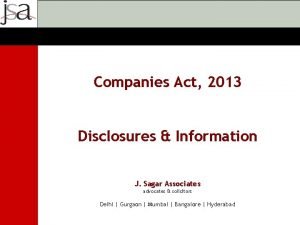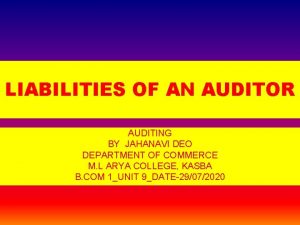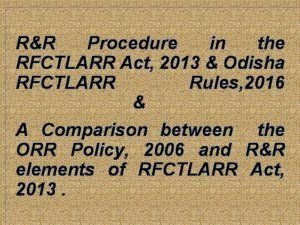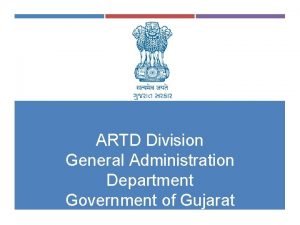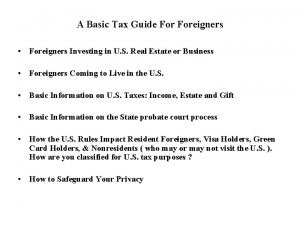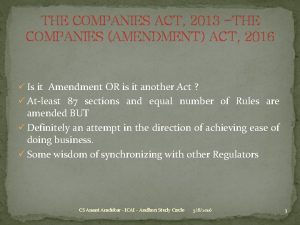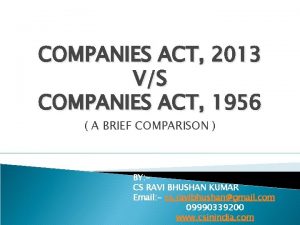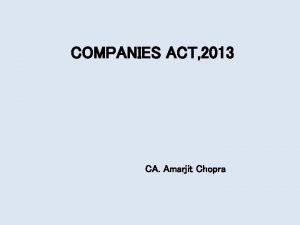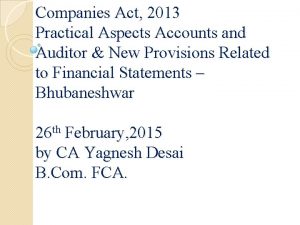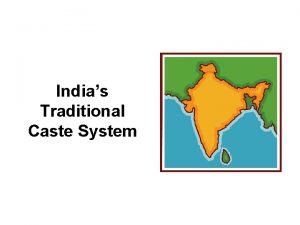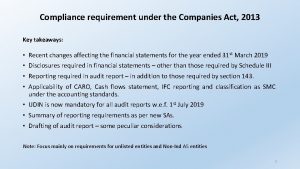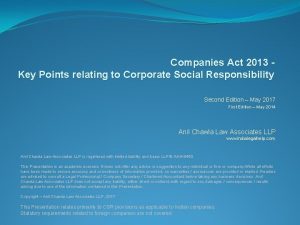Indias Companies Act 2013 Key Aspects for Foreigners













































- Slides: 45

India’s Companies Act 2013 Key Aspects for Foreigners Fourth Edition – June 2021 First Edition – March 2014 Anil Chawla Law Associates LLP www. indialegalhelp. com Anil Chawla Law Associates LLP is registered with limited liability and bears LLPIN AAA‑ 8450. This Presentation is an academic exercise. It does not offer any advice or suggestion to any individual or firm or company. While all efforts have been made to ensure accuracy and correctness of information provided, no warranties / assurances are provided or implied. Readers are advised to consult a Legal Professional / Company Secretary / Chartered Accountant before taking any business decisions. Anil Chawla Law Associates LLP does not accept any liability, either direct or indirect, with regard to any damages / consequences / results arising due to use of the information contained in this Presentation. Copyright – Anil Chawla Law Associates LLP, 2021

Table of Contents June 2021 www. indialegalhelp. com 2

Preface Indian economy, despite the setback due to Covid-19, has the potential for fast growth. A large economy with growth potential combined with India’s stable political system, free economy and dynamic spirit of the people has been attracting interest from business houses and individuals across the globe. This Presentation is part of the on-going efforts of Anil Chawla Law Associates LLP to help the world get a better understanding of India and her legal system. Companies Act, 2013 replaced Companies Act, 1956. The new Act was intended to bring Indian company law in line with global practices. However, the new law did not lead to simplification of procedures. The law has been going through amendments as Government of India tries to make it more business friendly. It is imperative for any foreign national or company to develop an understanding of the law related to companies in India, if it intends to do business in India. This Presentation is for Indian citizens resident abroad as well as foreign nationals. It aims to give an overall perspective of the company law in India as relevant to foreigners. In this Presentation, key points related to a topic are given in one slide and the relevant extract from Companies Act, 2013, as amended to date, is given verbatim in the next slide. We, Anil Chawla Law Associates LLP, shall be glad to assist a foreign national or company professionally for their venture in India. Anil Chawla Senior Partner, Anil Chawla Law Associates LLP June 2021 www. indialegalhelp. com 3

Who is a Foreign Resident? The Companies Act, 2013 (the Act) does not define a foreign resident / foreigner. Any one (including an Indian citizen) may be treated like a foreign resident if he / she has not been staying in India for continuous period of 12 months immediately preceding the date of his appointment as a managerial person (Schedule V). Anyone (including an Indian citizen) who has stayed in India for a total period of less than 182 days during a financial year (1 April to 31 March) will be treated as a foreign resident (Sec. 149(3)). A foreign citizen staying in India for >182 days during a financial year may enjoy all rights under the Act while the same rights are not available to a Non-resident Indian citizen. June 2021 www. indialegalhelp. com 4

A. Three Important Points A 1. Need for a Resident Director A 2. Appointment of Managing Director A 3. Attending Board Meetings A 4. Attending Annual General Meeting June 2021 www. indialegalhelp. com 5

A 1. Resident Director Every company (whether private or public) needs a resident director. Resident Director condition – 182 days. For a newly incorporated company, one of the directors should be resident in India for more than half of the days that the company is in existence during the financial year in which the company is incorporated. Resident director need not be Indian citizen. June 2021 www. indialegalhelp. com 6

A 1. Resident Director (Continued) § Total Stay; not continuous days. § Minimum 182 days stay in India during the FINANCIAL year. § Necessary even for a newly incorporated company; Stay requirement in proportion to the number of days of existence of the company during a financial year. § No relaxations / exceptions. Sub-section 149(3) June 2021 www. indialegalhelp. com 7

A 2. Appointment of Managing Director Must be a resident of India. If not a resident, Central Government approval necessary. Resident not defined; Explanation I lists two categories which are included (a) staying in India for a continuous period of not less than 12 months immediately preceding the date of his appointment (b) has come to India for taking up employment in India or for carrying on business or vacation in India. (The word vacation is an obvious mistake. It should have been vocation. ) Strictly speaking, an Indian citizen who has gone to visit his son in USA and stayed there for, say, two months will need Central Government approval for appointment as MD. Proviso does not mention Business Visa. A badly drafted Schedule with a typographical error. June 2021 www. indialegalhelp. com 8

A 2. Appointment of Managing Director (Continued) Sub-section 196(4) & Schedule V June 2021 www. indialegalhelp. com 9

A 3. Attending Meeting of Board of Directors Necessary for a Director to attend at least one meeting in a year. Participation may be in person or by video conference. Physical meetings can be held anywhere in the world. Video conference meetings will not be able to take up all issues. The issues that need physical meetings have been specified in Rule 4 of the Companies (Meetings of Board and its powers) Rules, 2014. In case quorum (usually two directors) is present physically, other directors can join using video conference. In such a case all matters including issues not allowed under Rule 4 can be taken up. Video meetings will need to be recorded (The requirement is not for physical meetings). Telephonic conferences (audio only) not recognized. June 2021 www. indialegalhelp. com 10

A 3. Attending Meeting of Board of Directors (Continued) A small company need to hold minimum two board meetings in a year. Practically possible to own a company in India without ever coming to India. Rule 4 of the Companies (Meetings of Board and its powers) Rules, 2014 4 Matters Not to be Dealt With in a Meeting Through Video Conferencing or Other Audio Visual Means (1) The following matters shall not be dealt with in any meeting held through video conferencing or other audio visual means. (i) the approval of the annual financial statements; (ii) the approval of the Board’s report; (iii) the approval of the prospectus; (iv) the Audit Committee Meetings for 2[consideration of financial statement including consolidated financial statement if any, to be approved by the board under sub-section (1) of section 134 of the Act]; and (v) the approval of the matter relating to amalgamation, merger, demerger, acquisition and takeover. Provided that where there is quorum presence in a meeting through physical presence of directors, any other director may participate conferencing through video or other audio visual rneans. (2) For the period beginning from the commencement of the Companies (Meetings of Board and its Powers) Amendment Rules, 2020 and ending on the 30 th June 2021, the meetings on matters referred to in sub-rule (1) may be held through video conferencing or other audio visual means in accordance with rule 3. June 2021 www. indialegalhelp. com 11

A 3. Attending Meeting of Board of Directors (Continued) Sub-sections 173(2) and 167(1)(b) June 2021 www. indialegalhelp. com 12

A 4. Attending Annual General Meeting Necessary for a company (except one-person company) to hold a meeting of members (AGM) at least once in a year. Usually, to be held in the city of registered office. For unlisted company, if members agree, AGM can be held at any place in India or can be held by video conferencing. Video conference meetings of unlisted companies can take up all issues. Advisable for video meetings to be recorded. Telephonic conferences (audio only) not recognized. June 2021 www. indialegalhelp. com 13

A 4. Attending Annual General Meeting (Continued) Sub-sections 96(1) & 96(2) June 2021 www. indialegalhelp. com 14

B. Points of Interest / Concern B 1. One-Person Company B 6. Resignation by all Directors B 2. Financial Year B 7. Associate Company B 3. Promoter B 8. Subsidiary Company B 4. Officer in Default B 9. Public Company B 5. Control of Company June 2021 www. indialegalhelp. com 15

B 1. One Person Company Initially it appeared to be useful for persons from Western world but the Rules issued in 2014 closed this category to foreign citizens completely. Before 2021, only Indian citizens who were residents of India could set up a one-person company. However, with effect from 1 April 2021 Indian citizens resident outside India are also eligible to set up one-person company. Rule 3 of The Companies (Incorporation) Rules, 2014 June 2021 www. indialegalhelp. com 16

B 1. One Person Company (Continued) Sub-sections 2(62) & 3(1) June 2021 www. indialegalhelp. com 17

B 2. Financial Year in India is 1 April to 31 March. An Indian company, which is holding company or subsidiary of a foreign company may apply for adopting a different financial year if needed to consolidate its accounts with the foreign company. Application to be made to the Tribunal. Corresponding change not made in Income Tax. Section 2(9) of IT Act states - "assessment year" means the period of twelve months commencing on the 1 st day of April every year. Companies adopting a different F. Y. under Companies Act will still need to prepare accounts for April-March to comply with IT Act. June 2021 www. indialegalhelp. com 18

B 2. Financial Year (Continued) Sub-section 2(41) June 2021 www. indialegalhelp. com 19

B 3. Promoter A new concept introduced under India’s Companies Act, 2013. A foreign company / individual getting into a Joint Venture (JV) with an Indian partner must decide if they want to be known as the Promoter of the Indian company. If the foreigner does not want to be a Promoter care should be taken in drafting the JV Agreement regarding their powers in relation to control over the affairs of the Indian company and about powers to give directions to the Board. On the other hand, there are clear advantages in becoming a Promoter and the foreigner may be advised to get the status. Power of Promoter to give directions to the Board may be cast in stone in the JV Agreement. June 2021 www. indialegalhelp. com 20

B 3. Promoter (Continued) Sub-section 2(69) June 2021 www. indialegalhelp. com 21

B 4. Officer in Default includes Directors, Key Managerial Personnel and also Promoters. Promoter is likely to be the first to be caught along with the Directors as an Officer in Default, if the company makes some mistakes. Officer in Default need not be an individual since the word used is “person” and not an individual. So a foreign company may become Officer in Default. Officer need not be an employee of the company. Officer need not even receive any remuneration / benefit from the company. The key is “any person in accordance with whose directions or instructions, the Board of Directors or any one or more of the Directors is or are accustomed to act. ” If a foreigner wishes to avoid being Officer in Default, he / she should not become a Director and roles / responsibilities under the JV Agreement should be carefully defined. June 2021 www. indialegalhelp. com 22

B 4. Officer in Default - (Continued) Sub-sections 2(59) and 2(60) June 2021 www. indialegalhelp. com 23

B 4. Officer in Default - (Continued) Sub-section 2(60) Continued June 2021 www. indialegalhelp. com 24

B 5. Control of the Company A much wider term than Promoter since many possibilities are covered including due to either of (a) shareholding (b) management rights (c) shareholders’ agreement (d) voting agreement (e) any other manner. Key is right to (a) appoint majority of the Directors or (b) control management or policy decisions. Existence of right will establish control. One may have never exercised the right. Adverse effects of being in control are not clear. All punishments and penalties are for officers and not for person in control. So, there need not be any fear of becoming in control. June 2021 www. indialegalhelp. com 25

B 5. Control of the Company (Continued) Sub-section 2(27) June 2021 www. indialegalhelp. com 26

B 6. Resignation by all Directors A special situation that gives power to Promoter who appoints directors when all directors have resigned. Now it is possible for a Promoter to manage a private company with all dummy directors who will hold office at the pleasure of the Promoter. Articles of a private co. may provide “Directors shall hold office at the pleasure of the Promoter and displeasure of the Promoter will be a disqualification under 164 of the Act”. Foreign Investors / Entrepreneurs may take advantage of this to ensure better control on Indian directors. Sub-section 164(3) June 2021 www. indialegalhelp. com 27

B 6. Resignation by all Directors (Continued) Sub-sections 167(3 -4), 168(3) June 2021 www. indialegalhelp. com 28

B 7. Associate Company A new concept in Indian law (Was earlier in Accounting Standards). A foreign company (FC) owns 20% or more share capital of Indian company (IC) or has control of business decisions. IC is associate of FC but FC is not associate of IC. Associate is a one-way relation and not a two-way relationship. Often the Indian Joint Venture of a Foreign Company is an Associate Company of the Foreign Company under the Act. Need to check from the view of home law of the Foreign Company whether the Indian Company is an Associate. This is important from the view of accounting of the Foreign Company. June 2021 www. indialegalhelp. com 29

B 7. Associate Company (Continued) Sub-section 2(6) June 2021 www. indialegalhelp. com 30

B 8. Subsidiary Company One of two criteria – (a) control composition of Board of Directors or (b) exercise or control more than half of the total voting power (which generally means equity share capital). Restriction on number of layers. Controlling composition means one can appoint or remove all or majority of the directors. If holding company is a foreign company, the Indian subsidiary will be deemed to be a public limited company – ref. definition of public company, sub-section 2(71). Any JV agreement involving a foreign company must mull whether the foreign company wants to create a subsidiary. June 2021 www. indialegalhelp. com 31

B 8. Subsidiary Company (Continued) Sub-section 2(87) June 2021 www. indialegalhelp. com 32

B 8. Subsidiary Company (Continued) Sub-section 2(87) Continued June 2021 www. indialegalhelp. com 33

B 9. Public Company A subsidiary of any company (which is not a private company) is a public company. Definition of private company refers to a company having less than 200 members and where right of members to transfer shares is restricted. Definition of company refers only to company registered in India. Foreign company, which is parent of the Indian subsidiary company, will be covered under the definition of “holding company” under sub-section 2(46) wherein company includes any body corporate. By joining up all definitions, it emerges that any Indian subsidiary of a foreign company will be deemed to be a public company. Legal position on this point is in the process of evolution and may change in the years to come. June 2021 www. indialegalhelp. com 34

B 9. Public Company (Continued) Sub-sections 2(71); 2(20) and 2(68) June 2021 www. indialegalhelp. com 35

B 10. Authorized Capital Authorized capital is the maximum amount of share capital that a company is allowed to raise. At the time of incorporation, authorized capital is declared in the Memorandum of Association of the company. Increase of authorized capital can be done at any time without much difficulty. The Companies (Amendment) Act, 2015 removed the need for a minimum authorized capital for a company. A very low (almost zero) capital company is often convenient foreign citizens who wish to own an Indian entity without committing investments. A low capital company is also useful for setting up shell companies for participation in government tenders. Capital of the shell company can be suitably increased if the tender bid is successful. June 2021 www. indialegalhelp. com 36

B 10. Authorized Capital (Continued) Sub-section 2(8) of the Act and Section 2 of The Companies Amendment Act, 2015 June 2021 www. indialegalhelp. com 37

C. Points for Collaboration C 1. Additional Matters in Articles of Association C 2. Merger of Indian Company with Foreign Company June 2021 www. indialegalhelp. com 38

C 1. Additional Matters in Articles of Association Articles can include all types of restrictive clauses that JV partners wish to include to safeguard their interests. For example, one may include a provision in the Articles of a new company that all decisions of Board shall be by consensus. For example, one may also include a provision that a Special Resolution / Extra Ordinary General Meeting will need approval of all directors without any absentees. Use of standard Articles of Association should be avoided in case of Joint Venture involving foreigners. A Shareholders’ Agreement / JV Agreement has limited enforceability. Articles of Association is a stronger document and higher care should be taken. Entrenchment – a new word in Indian law – needs careful attention. Entrenchment provides for additional restrictions on amendment of Articles of Association. For example, one may provide for alteration of parts or whole of Articles by consensus only. June 2021 www. indialegalhelp. com 39

C 1. Additional Matters in Articles (Continued) Sub-sections 5(2 -5) June 2021 www. indialegalhelp. com 40

C 2. Merger of Indian Company with Foreign Co. Notified in April 2017. Prior approval of Reserve Bank of India is required. Permitted with only companies incorporated in jurisdictions specified by Central Government. It may be worthwhile for Joint Venture Agreements to provide for the merger of either Indian company with the foreign company or vice versa, subject to such terms as may be provided in the Agreement and also subject to the rules / restrictions under section 234 of the Act. June 2021 www. indialegalhelp. com 41

C 2. Merger with a Foreign Company (Continued) Section 234 June 2021 www. indialegalhelp. com 42

C 2. Merger with a Foreign Company (Continued) Rule 25 A of Companies (Compromises, Arrangements and Amalgamations) Rules, 2016 June 2021 www. indialegalhelp. com 43

C 2. Merger with a Foreign Company (Continued) Annexure B of Companies (Compromises, Arrangements and Amalgamations) Rules, 2016 June 2021 www. indialegalhelp. com 44

Helps you with – Strategic Advice, Global Business Structures, Wealth Management and Succession Planning, International Corporate Relationships, Resolving Disputes without Litigation, International Investment Arbitration, International Commercial Arbitration, Insolvency Assistance We take an entrepreneur’s perspective on every issue. Seeing our clients' business grow and prosper is our passion. www. indialegalhelp. com info@indialegalhelp. com We follow a transparent system for fees. Please look at our Indicative Rates (http: //www. indialegalhelp. com/files/indicativerates. pdf ) before contacting us. June 2021 www. indialegalhelp. com 45
 Appointment of registered valuer under companies act, 2013
Appointment of registered valuer under companies act, 2013 Website disclosures under companies act 2013
Website disclosures under companies act 2013 Section 230-240 of companies act 2013
Section 230-240 of companies act 2013 Introduce taiwan to foreigners
Introduce taiwan to foreigners The proposed emigrant dumping site
The proposed emigrant dumping site Indias religions
Indias religions Indias religions
Indias religions Is hinduism the first religion
Is hinduism the first religion Indias first empire
Indias first empire Indias first civilization
Indias first civilization Flota de indias ruta
Flota de indias ruta Varna system
Varna system Sociedad colonial americana
Sociedad colonial americana Indias first empire
Indias first empire Criminal liabilities of an auditor
Criminal liabilities of an auditor Companies act 2015 fiji
Companies act 2015 fiji Depreciation on air conditioner as per companies act
Depreciation on air conditioner as per companies act Section 11 company directors disqualification act
Section 11 company directors disqualification act Udin login
Udin login Joint stock companies act 1844
Joint stock companies act 1844 Macbeth act 3-5 summary
Macbeth act 3-5 summary Rfctlarr act 2013 odisha
Rfctlarr act 2013 odisha Gujarat general administration department
Gujarat general administration department What is ghag
What is ghag Enhanced basic education act of 2013
Enhanced basic education act of 2013 Business model canvas example
Business model canvas example Key partners
Key partners Fspos vägledning för kontinuitetshantering
Fspos vägledning för kontinuitetshantering Typiska drag för en novell
Typiska drag för en novell Tack för att ni lyssnade bild
Tack för att ni lyssnade bild Ekologiskt fotavtryck
Ekologiskt fotavtryck Shingelfrisyren
Shingelfrisyren En lathund för arbete med kontinuitetshantering
En lathund för arbete med kontinuitetshantering Underlag för särskild löneskatt på pensionskostnader
Underlag för särskild löneskatt på pensionskostnader Tidböcker
Tidböcker Sura för anatom
Sura för anatom Förklara densitet för barn
Förklara densitet för barn Datorkunskap för nybörjare
Datorkunskap för nybörjare Boverket ka
Boverket ka Debatt mall
Debatt mall För och nackdelar med firo
För och nackdelar med firo Nyckelkompetenser för livslångt lärande
Nyckelkompetenser för livslångt lärande Påbyggnader för flakfordon
Påbyggnader för flakfordon Formel för lufttryck
Formel för lufttryck Offentlig förvaltning
Offentlig förvaltning Jag har nigit för nymånens skära text
Jag har nigit för nymånens skära text

